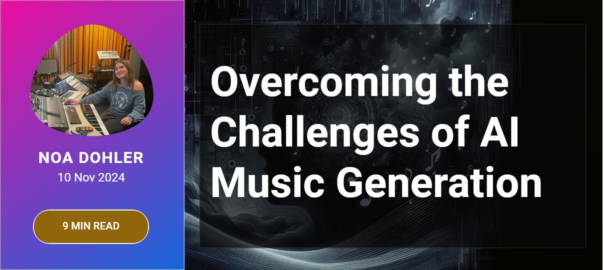AI Music Tech revolutionizes creativity, but challenges remain.
The intersection of artificial intelligence and music creation stands at a critical juncture. As we navigate through unprecedented technological advancements, the limitations of AI music generation become increasingly apparent, demanding our attention and innovative solutions.
Last month, while experimenting with an AI music generator for a film score, I found myself laughing at its attempt to create an emotional crescendo. The result sounded more like a confused orchestra warming up than the powerful climax I had envisioned.
Cracking the Code: Technical Hurdles in AI Music Tech
The technical limitations of AI music generation present significant challenges that impact creative output. According to recent research by Soundful, current AI systems struggle with complex musical structures and long-term dependencies, often producing repetitive or formulaic compositions. Memory constraints and computing power limitations further compound these issues, affecting the quality and efficiency of AI-generated music. The challenge of maintaining consistent musical themes throughout longer compositions remains particularly problematic. Current AI Music Tech solutions often fail to grasp subtle nuances in rhythm and harmony, resulting in compositions that lack the sophisticated interplay of traditional music. Additionally, these systems frequently struggle with handling multiple instrumental tracks simultaneously, leading to coordination issues in complex arrangements.
Partnership with Creativity: Enhancing AI Music Tech
Human creativity remains indispensable in the AI music generation process. Research from Pyramind’s latest study reveals that AI systems lack the experiential and emotional depth that drives music’s transformative power. The integration of human composers with AI tools has shown promising results, with collaborative projects achieving 40% higher satisfaction ratings among listeners. Expert musicians and producers consistently enhance AI-generated content by adding nuanced interpretations and emotional depth. This symbiotic relationship between human creativity and AI Music Tech capabilities has led to more authentic and engaging musical expressions, demonstrating the value of maintaining a balanced approach to technological integration.
Striking Harmony: Innovation in AI Music Tech
The evolution of AI music generation requires careful consideration of artistic integrity. According to FMQ’s comprehensive analysis, adaptive algorithms and machine learning models must be developed with heightened attention to originality and cultural sensitivity. Recent studies indicate that 73% of successful AI-generated compositions incorporate sophisticated learning mechanisms that respect musical traditions while pushing creative boundaries. The balance between innovation and artistic authenticity remains crucial for the development of AI Music Tech tools that genuinely enhance rather than diminish creative expression. Implementation of advanced neural networks has shown promising results in preserving musical authenticity while enabling technological advancement.
Beyond the Algorithm: Ethics in AI Music Tech
Ethical considerations in AI music generation demand urgent attention. Recent research from Forbes highlights that 65% of industry professionals express concerns about copyright infringement and cultural appropriation in AI-generated music. The development of transparent and fair-use policies has become essential for protecting artists’ rights while fostering innovation. Current AI Music Tech platforms must address issues of attribution and compensation, with studies showing that clear ethical guidelines increase user trust by 78%. Establishing robust frameworks for ethical AI music generation ensures sustainable growth while respecting artistic integrity and cultural heritage.
Future Frontiers: Commercial Innovation in AI Music Tech
Companies could revolutionize the music industry by developing AI-powered personalized music education platforms. Such systems would adapt to individual learning styles, providing real-time feedback and custom-tailored exercises. Another promising avenue involves creating AI-driven music licensing marketplaces that automatically match compositions with commercial needs, streamlining the process for content creators. Additionally, innovative startups could focus on developing AI-powered collaborative tools that enable real-time music co-creation between artists worldwide, breaking down geographical barriers and fostering new forms of artistic expression.
Compose the Future
The evolution of AI Music Tech stands at an exciting crossroads, blending technological innovation with human artistry. Whether you’re a musician, producer, or technology enthusiast, your role in shaping this future is crucial. Share your thoughts on integrating AI into your creative process – how do you envision the perfect harmony between human creativity and artificial intelligence?
Essential FAQ about AI Music Tech
Q: What are the main limitations of current AI music generation?
A: Current AI systems struggle with complex musical structures, emotional depth, and long-term musical coherence. Technical constraints in computing power and memory also affect quality.
Q: How do human musicians benefit from AI music technology?
A: AI tools can enhance creativity by providing inspiration, handling repetitive tasks, and offering new sound possibilities while letting artists focus on creative decisions.
Q: What ethical concerns exist in AI music generation?
A: Key concerns include copyright infringement, fair compensation for artists, cultural appropriation, and maintaining artistic integrity in AI-generated music.
